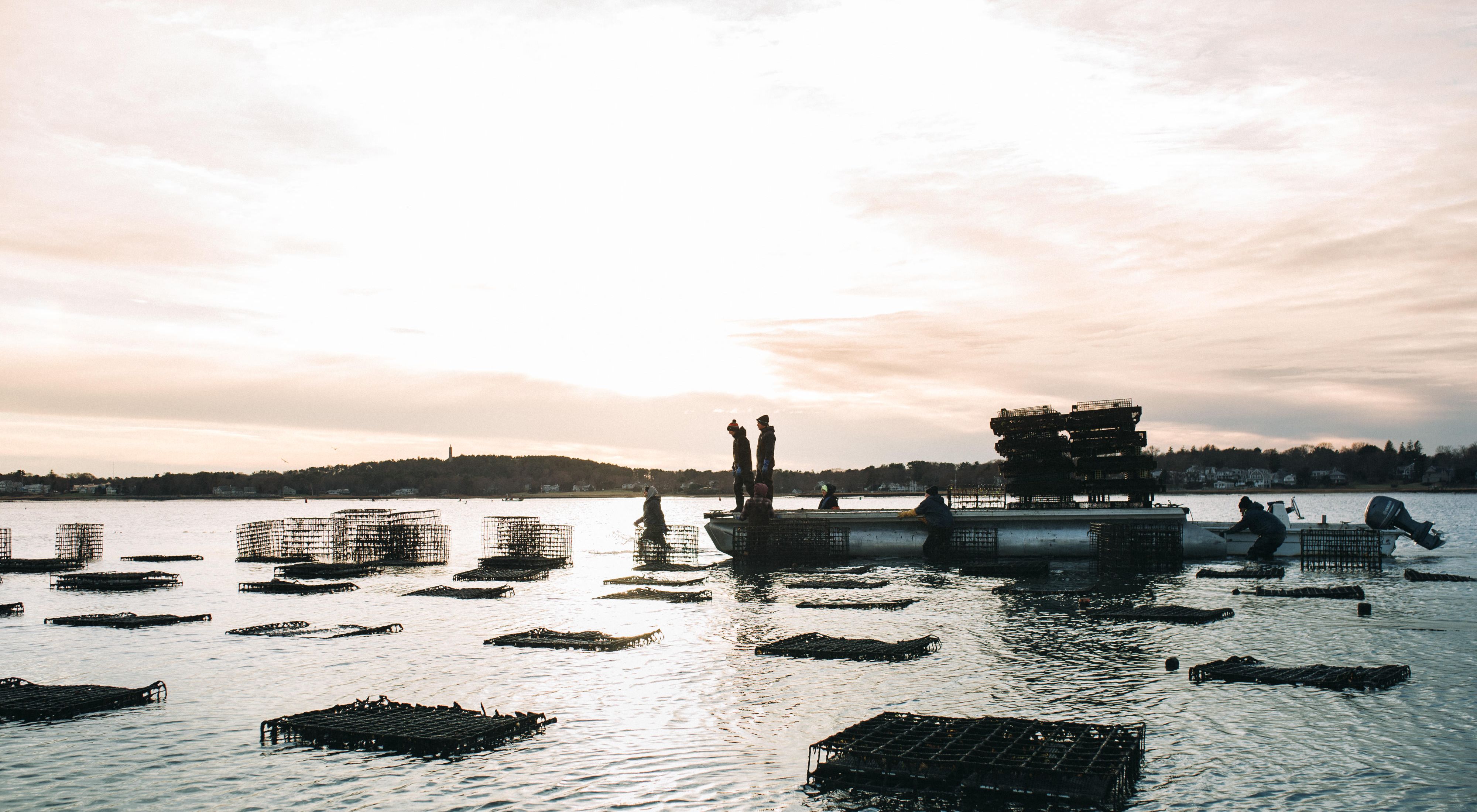What is the Shellfish Growers Climate Coalition?
Learn more about the shellfish growers, wholesalers and restaurateurs across the United States who are uniting to speak up on climate.
Contact the Coalition
Questions about the coalition or its work? Contact Sally McGee at smcgee@tnc.org.
ABOUT THE COALITION
Anywhere there’s a shoreline, you can find signs of the impacts of climate change—sea level rise, ocean acidification, increased frequency and severity of storms. You’ll also find shellfish growers, many of whom have been making their living farming from the sea for generations and whose businesses form the backbone of their small-town coastal communities.
Enter: the Shellfish Growers Climate Coalition—a passionate group of shellfish farmers, harvesters, hatchery operators, wholesalers, retailers and restauranteurs from every U.S. coast and Canada. Members are committed to bringing about climate action by sharing personal stories about how climate change has impacted their lives and livelihoods. The coalition’s goal is to advocate for sound climate policy and secure a low-carbon future to benefit the shellfish we love and the waters that sustain them—before it's too late.
Coalition FAQ
General
-
Our coalition was established in 2018 when a group of seven U.S. shellfish farmers partnered with The Nature Conservancy to help move the needle on climate change. We are an “endorsement” coalition, with all members supporting the goal of reduced carbon emissions. The SGCC is open to representatives from all food sectors who wish to engage with consumers and policymakers to help chart America’s course towards a low carbon future.
-
- Fishers Island Oyster Farm, NY (Sarah and Steve Malinowski)
- Hama Hama Company, WA (Lissa James Monberg)
- Hog Island Oyster Company, CA (John Finger and Terry Sawyer)
- Island Creek Oyster Company, MA (Chris Sherman)
- Rappahannock Oyster Company, VA (Ryan Croxton)
- Taylor Shellfish Farms, WA (Bill Dewey)
-
Shellfish growers are seeing a range of impacts on their businesses and their bottom lines. Some are experiencing the impact of ocean acidification, which is influenced by increased carbon dioxide in the atmosphere, on larval oysters that are unable to grow shell properly. Others are seeing the effects of sea level rise on their coastal businesses. Increasing frequency and intensity of storms can impact shellfish growers’ facilities and their ability to reliably get products to market. And, increasing water temperatures can lead to higher levels of bacteria such as Vibrio parahaemolyticus, which negatively impact shellfish farms by adding costs to ensure shellfish safety. Now, more than ever, the ocean waters our members depend on are in peril.
-
Climate change is nowhere more evident than along U.S. coastlines, where coastal communities and small business have borne the brunt of its destruction and devastation. While people understand the value of shellfish growers for farming and harvesting the seafood we all love to eat, the industry provides so much more than what’s on the raw bar. In many cases, our members have been farming from the sea for generations, and their businesses form the economic backbone of their small-town coastal communities. Moreover, shellfish is one of the most environmentally friendly and sustainable sources of protein, and certain species, such as oysters, can actually benefit the marine environment by filtering water, reducing shoreline erosion, and promoting marine biodiversity. The stakes are high, and by lifting up our voices as members of the shellfish industry, we can create the momentum needed for other people and other industries to do the same.
Joining the Coalition
-
All members agree on certain fundamental issues relating to climate change. Specifically:
- Human impact on the Earth’s climate system is well documented, scientifically understood and profound.
- Taking action to address climate change is imperative to secure the viability of our businesses, our communities and the natural resources they depend upon.
- Improving people’s understanding of climate change and its impact on our businesses represent an important way to secure public support for clean energy policies.
- Enacting policies that reduce carbon emissions and encourage low-carbon choices are crucial to a low carbon future.
Prospective members are asked to sign a conflict of interest form (to ensure no conflicts exist between the business and The Nature Conservancy). They are also asked to sign a Corporate Agreement among all Coalition members. That’s all that’s necessary to join!
-
The level of engagement is up to each individual member—some members are happy to simply have their company’s name listed as a member our put our logo on their website, while others join our Executive Committee or gather on Capitol Hill during Lobby Days. Many of our activities relate to The Nature Conservancy’s climate strategies, which form the foundation of the Coalition’s policy activities.
-
If you're a shellfish business and care about acting on climate, join the Shellfish Growers Climate Coalition today by filling out this form.
Impact
-
More and more members of the shellfish industry are reaching out to us to join the coalition every day, so there is growing strength in numbers. Member businesses engage with thousands of consumers; our expanding coalition has significant reach in terms of consumers and policymakers. Leveraged with The Nature Conservancy’s sound science and climate strategy, we expect the coalition will exercise significant influence at the state and federal level in terms of climate policy. By sharing out our unique, firsthand experiences with climate impacts with legislators and decisionmakers, we hope to turn the tide on climate action—before it’s too late.
-
Coalition members have close business relationships with seafood wholesalers, restaurants and others that rely on a dependable source of shellfish, many of whom have become members. Additionally, members recognize that other food sectors are feeling the impacts of climate change, as well. Whether that be farmers in the Midwest, winemakers in Virginia or supermarket chains across the country, the coalition looks forward to partnering with other food sectors to address climate change.

